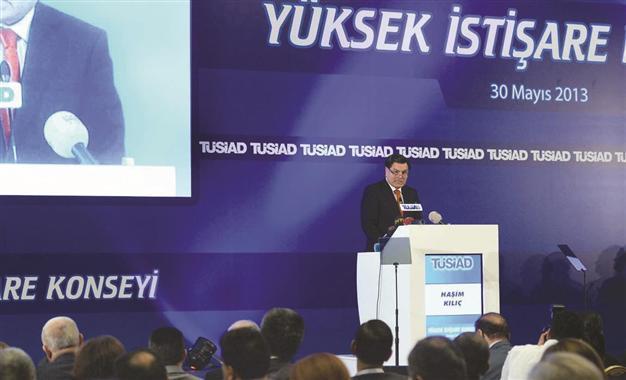Turkish judge warns on bans on different lifestyles
ANKARA - Hürriyet Daily News

Enacting laws without taking public sensitivities into account hurts the notion that Turkey is being ruled by the rule of law, top judge Kılıç warns. DAILY NEWS photo, Selahattin SÖNMEZ
Adding new chains of interference in lifestyles will only overstrain an already exhausted public consciousness, Turkey’s top judge has warned, in an apparent reference to ongoing discussions over lifestyles that were sparked after the government passed a regulation restricting the use of alcohol.“Steps that have been taken without convincing the public consciousness bring about nothing but a distortion of the record of the democratic rule of law in the state. Causing inconceivable violations of rights as a result of ignoring this reality is unacceptable for those who have the state authority,” Haşim Kılıç, President of the Constitutional Court said in his address to the High Advisory Council of the Turkish Industrialists’ and Businessmen Association (TÜSİAD) yesterday.
The top judge’s remarks followed the parliamentary approval of a government-led alcohol regulation that strictly restricts the sale and the use of alcoholic drinks.
“Our social and political history is full of traces of interference in different lifestyles based on imaginary fears and concerns,” Kılıç said, recalling interferences in the lifestyles of pious Muslims in Turkey in the past. “It’s a virtue to protect the rights of others. Even though we do not agree with them, it’s a natural reflex to share the burden of those whose rights have been violated.”
Kılıç also warned that violations on lifestyles caused irrecoverable damage to human dignity and it was the state’s mission to provide assurances to the individual to freely exercise his or her rights in his or her autonomous area.
Risks of presidency
Another message by Kılıç was on the ongoing debate over the government’s intention to change the administrative system from the current parliamentary system into a presidential one. Using French philosopher Montesquieu’s famous Spirit of Laws as the base of his conceptualization of today’s discussion in Turkey, Kılıç recalled the philosopher’s famous saying: “There would be an end of everything, were the same man or the same body, whether of the nobles or of the people, to exercise those three powers, that of enacting laws, that of executing the public resolutions, and of trying the causes of individuals.”
Underlining that the modern democratic-constitutional system was based on the principle of the separation of powers with concerns that those who have absolute power could abuse it, Kılıç urged that any amendment should be based on principles and not on specific personalities, giving the example of the 1982 Constitution that was designed to elect junta-leader Kenan Evren as the president. “The healthiest way to take our nation to the enlightenment is to shape our societal projects on the basis of principles. If the goal is to establish a rule of law state in which rights and freedoms of individuals are under assurances and to create a strong and stable administration, then this good will find its answer in the public opinion,” he stressed. “Whatever the system is, the system of checks and balances is of vital importance,” he said, and added that apart from an independent judiciary, an influential opposition was also needed in this sense. “The vacuum that would be caused by the inefficiency of the opposition in balancing would push the intention of authoritarianism of the governing power.”
No to ‘dead silence’
Recalling that Turkish political history had suffered from party closures and strict prohibitions against different voices in the past, he said freedoms guaranteed by the principle of rule of law should not be understood as “dead silence.” “On the contrary, the pluralistic and participatory nature of the democratic system obliges ‘vocal existence’ of those who are different,” he added.
Fair trials and the full independence of judges and prosecutors were also very important for the existence of the principle of the rule of law, he explained, adding that the majority of the individual applications to the Constitutional Court were made due to violations of the right to a fair trial.
















